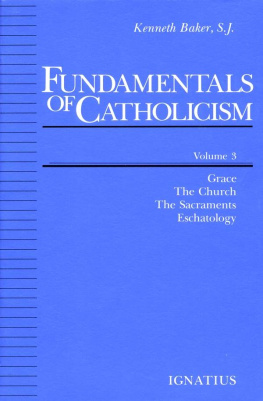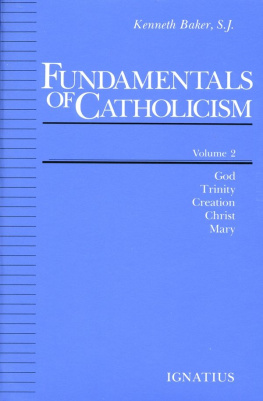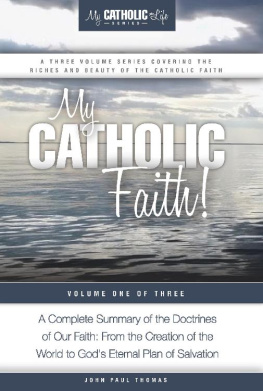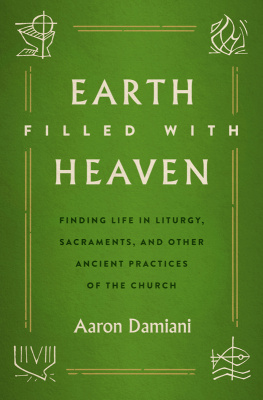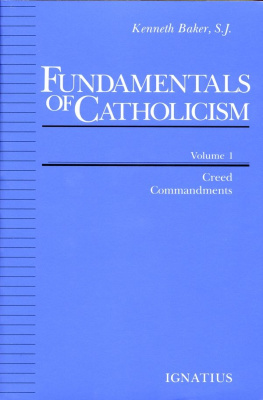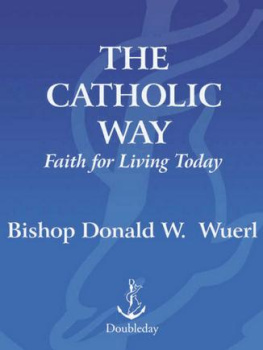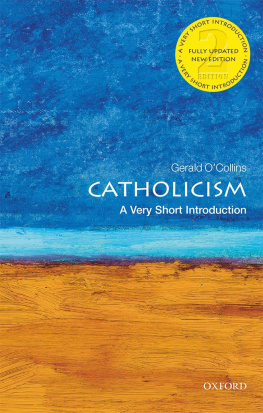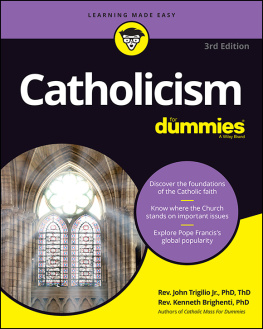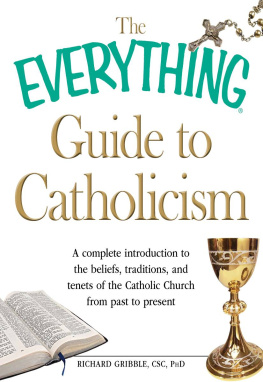FUNDAMENTALS OF CATHOLICISM
VOLUME III
FUNDAMENTALS
OF
CATHOLICISM
VOLUME III
by
KENNETH BAKER, S.J.
IGNATIUS PRESS SAN FRANCISCO
Imprimi Potest: Thomas R. Royce, S.J.
Provincial, Oregon Province
of the Society of Jesus
Portland, Oregon
Imprimatur: + Thomas J. Welsh
Bishop of Arlington, Virginia
Cover design by Riz Boncan Marsella
1983 Kenneth Baker, S.J.
All rights reserved
ISBN 0-89870-027-2 (PB)
ISBN 978-1-68149-733-4 (EB)
Library of Congress catalogue number 82-80297
Co-published by Ignatius Press, San Francisco
and Homiletic & Pastoral Review
86 Riverside Drive, New York, N.Y. 10024
Printed in the United States of America
CONTENTS
PART I
GRACE
THE MYSTERY OF DIVINE GRACE
Having completed our consideration of Jesus Christ in Volume 2, both with regard to who he is and what he did for us (redemption), we will now move on to an examination of the fruit of redemption itself, which is called divine grace. The notion of grace is very common in Catholic thinking and practice. At an early age we learned that we gain the grace of God by praying, by attending Mass and going to confession, by performing acts of penance and by saying the Rosary.
Every Catholic schooled in catechism knows that one must die in the state of sanctifying grace in order to be saved and to go to heaven. Many will recall the definition of grace that they learned from their catechism: Grace is the supernatural life of the soul that makes us children of God and heirs of heaven. What I propose to do in the following essays is to explain the fundamental ideas and teachings of the Church on this very important subject of grace.
In the course of history many errors and heresies have arisen which are contrary to the true doctrine of the Church on grace. In order to steer ones way safely through these treacherous theological waters, it is absolutely essential to adhere to the certain, clear teaching of the Magisterium of the holy Roman Catholic Church.
The Catholic doctrine of grace is intimately connected with the doctrine of original sin. You may recall that in previous essays I explained the Churchs teaching on the Fall of our first parents. Briefly, God created Adam and Eve and placed them in the Garden of Paradise; in addition to their natural and preternatural gifts, he bestowed on them sanctifying grace or original justice which made them children of God and heirs of heaven. This meant that they were eventually destined for the Beatific Vision of God for all eternity.
Adam and Eve sinned against God; they rebelled against him. As punishment they were cast out of Paradise. They lost sanctifying grace; they lost their preternatural gifts of immunity from suffering and death. From Adam until Christ the state of man was one of alienation from God. The gates of heaven were closed and mans state was desperate.
The point of Jesus death on the cross on Calvary is that he reconciled man with God in principle. After Christ, his objective redemption must be accepted and appropriated by each man and woman so that it may come to fruition in the subjective redemption of each person. The application of the fruits of the redemption to the individual person is called in Catholic theology sanctification or justification.
Because God has endowed human nature with the exceptional gifts of reason and free will, the process of justification requires the free cooperation of each person. Gods grace is offered freely to each human being (see 1 Tim 2:4), but grace works together with mans freedomnot in opposition to it. Because God made us free he does not force our wills; he wants us to love him freely in return, but he will not force us. The impenetrable mystery of divine grace is located in the mutual cooperation of Gods power and human freedom. In the course of these essays I will try to explain as clearly as I can what the Church says on this difficult and important matter, but please do not expect everything to be perfectly clear. After all, we are dealing with a divine mystery. Through revelation and the teaching of the Church we know a great deal about it, but we cannot explain everything; if we could, the mystery would no longer be a mystery.
In the working out of the salvation of each human person God helps man not merely by the interior principle of divine grace, but also by exterior helps, such as the life of Christ, revelation, the teaching of the Church and the dispensing of the sacraments. The ultimate goal of grace and all subjective redemption is the face-to-face Beatific Vision of God.
In the language of the Bible grace is the condescension or special benevolence and favor shown by God to the human race. In the objective sense, grace is the unmerited gift that proceeds from this benevolent disposition.
As the Church understands it, grace is something more than the gifts of nature, such as creation and the fertility of the soil. For grace is a supernatural gift of God that he bestows freely on rational creatures so that they can attain personal union with him. Grace is totally supernatural; it surpasses the being, powers and claims of nature and includes sanctifying grace, actual grace, the infused virtues and the gifts of the Holy Spirit. By grace we become sharers in trinitarian life.
The essence of grace is its gratuity, since no creature has or can have a right to the Beatific Vision. And the purpose of divine grace is to bring us to the face-to-face vision of God.
SPEAKING OF GRACE
In Catholic theology the word grace is used in many different ways. It usually carries the connotation of supernatural and gratuitous , but we should pay close attention to how it is used in each case. As we saw in the last essay, Grace is the supernatural life of the soul that makes us children of God and heirs of heaven.
The most basic division of grace is between sanctifying grace and actual grace. We will have much to say about these two terms shortly. Sanctifying or habitual grace is an abiding , supernatural and personal quality of the soul which sanctifies man intrinsically and makes him holy and pleasing to God.
Actual grace (or helping grace) is a temporary supernatural intervention by God by which the powers of the soul (especially intellect and will) are influenced to perform a salutary act which is directed to the attaining or preservation or increase of sanctifying grace.
The person who possesses sanctifying grace is pleasing to God; one who dies in the state of sanctifying grace will go to heaven and enjoy the face-to-face vision of God for all eternity.
Actual grace is a temporary help from God; it is wholly supernatural. It is given gratuitously by God to pagans and unbelievers to move them toward faith, hope and charity; it is given to Christian sinners to help bring them to repentance and to the reception of the sacraments; it is given to good Christians to help them become betterto help them become saints.
Another way of looking at grace is to consider whether it is uncreated grace or created grace. As one might suspect from the word itself, uncreated grace refers to God himself insofar as he dwells in the souls of the justified and insofar as he gives himself to the blessed in heaven for possession and enjoyment in the Beatific Vision.
What is given by God and possessed by the creature is God himself; therefore, this aspect of grace is called uncreated. The actual indwelling in the hearts of the faithful and the personal enjoyment of the Beatific Vision, considered as acts of a finite, created person, are called created graces because they have a beginning in time.
In other words, uncreated grace is God himself, while created grace is a supernatural gift or operation in the creature which is really distinct from God.
Next page
